Mobile photo editing pushes ethical limits due to the tension between artistic expression and authenticity. You're faced with social media pressure to present idealized images, fueled by advanced editing apps. Cultural perspectives vary, with some embracing alterations as self-expression while others prioritize authenticity. Influencers grapple with responsibility and transparency, as their edited content can shape unrealistic expectations. The challenge lies in balancing creativity with integrity, preserving the essence of a moment while enhancing its visual appeal. As technology evolves, so do the ethical considerations surrounding mobile photo manipulation. Understanding these complexities can help you navigate the fine line between enhancement and deception.
Defining Mobile Photo Editing Ethics
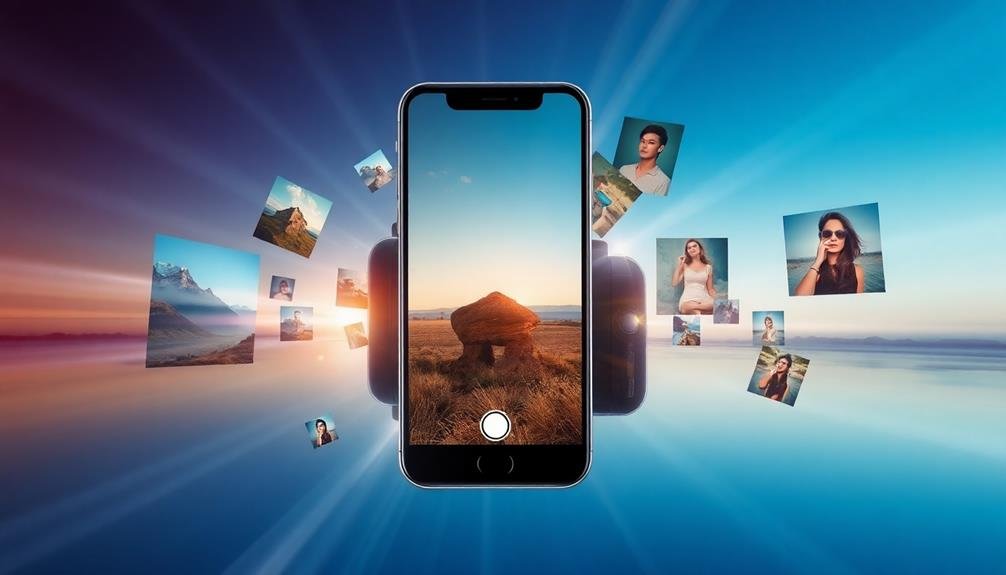
Integrity lies at the heart of mobile photo editing ethics. As you navigate the world of smartphone photography, it's essential to understand the boundaries between enhancement and deception. Mobile photo editing ethics revolve around maintaining authenticity while improving image quality. You're responsible for preserving the essence of the original scene, even as you adjust lighting, color, or composition.
Consider the context of your photos. News and documentary images demand strict adherence to reality, while creative or personal photos allow for more artistic interpretation. You'll need to balance artistic expression with truthful representation. Ask yourself: Does this edit misrepresent the subject or mislead viewers?
Transparency is key. If you've made significant alterations, it's ethical to disclose them. This includes major retouching, compositing, or removing/adding elements. You should aim to create visually appealing images without compromising the authenticity of the original capture.
Remember, your edits can impact perceptions and emotions. Use your power responsibly.
Ultimately, mobile photo editing ethics are about respecting your subjects, your audience, and the art of photography itself. By maintaining these principles, you'll create compelling images that stand up to scrutiny and preserve trust in visual communication.
Artistic Expression vs. Authenticity

The delicate balance between artistic expression and authenticity presents a challenge for mobile photographers. You're constantly faced with the decision of how much to edit your photos while maintaining their integrity.
As you explore the boundaries of mobile photo editing, you'll find yourself questioning whether your artistic vision aligns with the true essence of the captured moment.
Consider these elements when balancing artistry and authenticity:
- A vibrant sunset enhanced with saturation filters
- A portrait retouched to remove blemishes and wrinkles
- A landscape manipulated to include a dramatic sky
- Street photography with adjusted contrast for a gritty feel
- Wildlife shots color-graded to evoke specific emotions
Your artistic choices can transform an ordinary image into an enthralling work of art, but at what cost? You must weigh the impact of each edit on the photo's authenticity.
Ask yourself if the changes you're making enhance the story you're trying to tell or if they distort reality. Remember, your audience may appreciate your creative vision, but they also value honesty in visual storytelling.
Striking the right balance between artistic expression and authenticity will help you develop a unique style while maintaining credibility as a mobile photographer.
Social Media Pressure
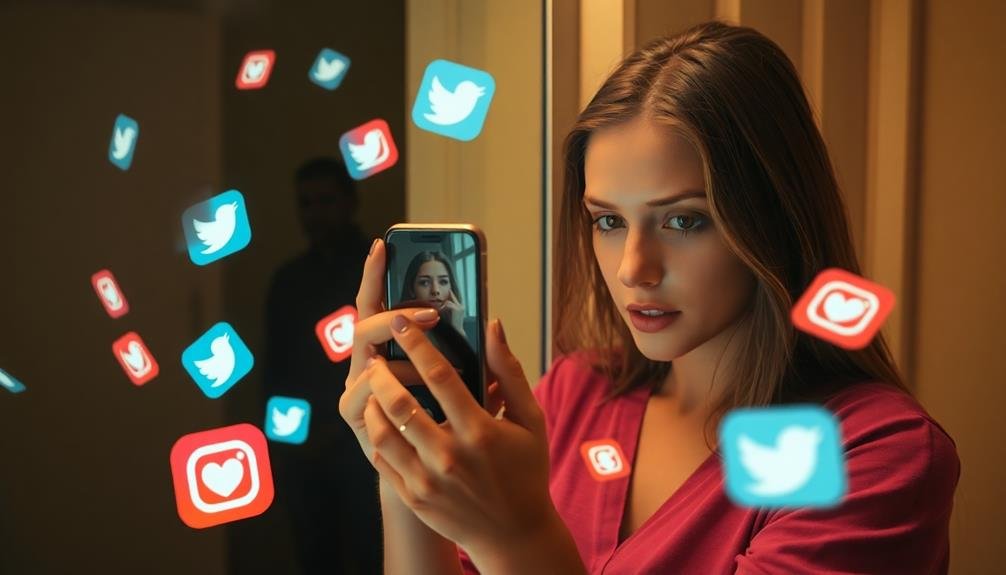
Social media platforms can fuel unrealistic beauty standards through heavily edited photos, leading you to question your own appearance.
As you scroll through your feed, you're bombarded with seemingly perfect images that create a culture of constant comparison.
This pressure often results in you creating content solely for likes, potentially compromising authenticity in favor of what you think will be popular.
Unrealistic Beauty Standards
Scrolling through social media feeds bombards users with a constant stream of seemingly perfect images, creating immense pressure to conform to unrealistic beauty standards.
You're constantly exposed to flawless skin, sculpted bodies, and picture-perfect lifestyles that often don't reflect reality. This relentless exposure can lead to decreased self-esteem, body image issues, and even mental health problems.
Mobile photo editing apps have made it easier than ever to alter your appearance, fueling the cycle of unrealistic expectations.
You might find yourself tempted to:
- Smooth out every wrinkle and blemish
- Slim down your waist or enhance curves
- Whiten teeth to an unnatural degree
- Change eye color or enlarge eyes
- Completely alter your facial structure
While these edits may seem harmless, they contribute to a distorted view of beauty.
You're not only deceiving others but also reinforcing unrealistic standards for yourself.
It's essential to recognize that these altered images aren't representative of real life.
Comparison Culture Impact
Closely tied to unrealistic beauty standards is the pervasive comparison culture fostered by social media platforms. You're constantly bombarded with perfectly curated images of friends, celebrities, and influencers, creating an environment where you feel pressured to measure up.
This digital landscape can lead to feelings of inadequacy and a compulsion to present an idealized version of yourself online. As you scroll through your feed, you might find yourself comparing your life, appearance, and achievements to others.
This constant comparison can take a toll on your mental health, leading to increased anxiety, depression, and lowered self-esteem. The pressure to portray a perfect life often drives you to extensively edit your photos, blurring the line between reality and fiction.
You may feel compelled to use advanced editing tools to alter your appearance, smooth your skin, or enhance your features to fit in with the seemingly flawless images you see.
This cycle perpetuates unrealistic expectations and further fuels the comparison culture, making it increasingly difficult to break free from the pressure to present an edited version of yourself online.
Likes-Driven Content Creation
The pursuit of likes and engagement on social media platforms has become a driving force behind content creation. You're constantly feeling the pressure to produce eye-catching, shareable content that will garner attention and boost your online presence.
This likes-driven approach often leads to pushing the boundaries of photo editing ethics, as you endeavor to create images that stand out in a crowded digital landscape.
You might find yourself:
- Dramatically altering your appearance
- Enhancing landscapes beyond recognition
- Fabricating entire scenes or events
- Misrepresenting products or experiences
- Manipulating emotions through false narratives
As you chase those coveted likes, you're inadvertently contributing to a cycle of unrealistic expectations and digital deception. You're not just editing photos; you're shaping perceptions and influencing others' self-image.
The pressure to maintain a certain aesthetic or lifestyle online can be overwhelming, leading to a disconnect between your digital persona and reality.
It's vital to reflect on the long-term impact of your content creation choices and strike a balance between engaging your audience and maintaining authenticity.
Technological Advancements in Editing Apps

Mobile photo editing apps have rapidly evolved in recent years, offering users an unprecedented array of tools and features. You'll find AI-powered filters, advanced retouching capabilities, and sophisticated layering options that rival professional desktop software.
These apps now incorporate machine learning algorithms to automatically enhance images, detect and remove imperfections, and even generate entirely new elements within photos. You can easily manipulate lighting, color grading, and composition with intuitive interfaces designed for touchscreens.
Many apps offer real-time editing previews, allowing you to see changes instantly as you apply them. Some cutting-edge features include facial recognition for targeted adjustments, object removal tools that intelligently fill in backgrounds, and style transfer algorithms that can transform your photos into various artistic styles.
Cloud integration enables seamless syncing across devices, while social media plugins facilitate quick sharing. As these apps continue to advance, you'll encounter more powerful editing capabilities, such as 3D object insertion, augmented reality filters, and even the ability to edit videos within the same interface.
The line between mobile and professional editing tools continues to blur, empowering you to create increasingly polished and complex visual content on your smartphone.
Cultural Perspectives on Photo Manipulation
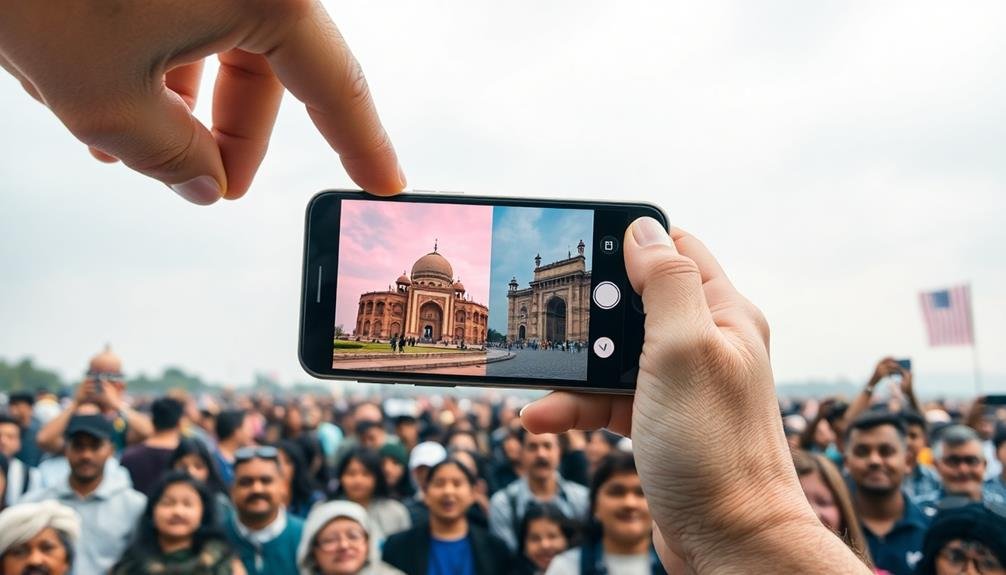
While technological advancements have made photo manipulation more accessible, cultural attitudes towards this practice vary widely around the world. You'll find that Western societies often place a high value on authenticity, leading to debates about the ethics of altering images.
In contrast, some Asian cultures view photo editing as a form of self-expression and enhancement, with less stigma attached to manipulated images.
Reflect on these diverse cultural perspectives on photo manipulation:
- A Japanese purikura booth, where friends enthusiastically apply digital stickers and filters
- An Instagram influencer in Los Angeles carefully disclosing edited content
- A Brazilian wedding photographer subtly retouching candid shots
- A French photojournalist adhering to strict ethical guidelines for news images
- A Chinese social media user freely altering their appearance in every post
You'll notice that professional contexts often have stricter rules about photo manipulation, regardless of cultural norms. News organizations, scientific publications, and legal documents typically require unaltered images.
However, personal and artistic use of photo editing remains largely influenced by cultural attitudes. As you navigate the world of mobile photo editing, it's essential to reflect on these varying perspectives and adjust your approach accordingly.
Legal Implications of Altered Images
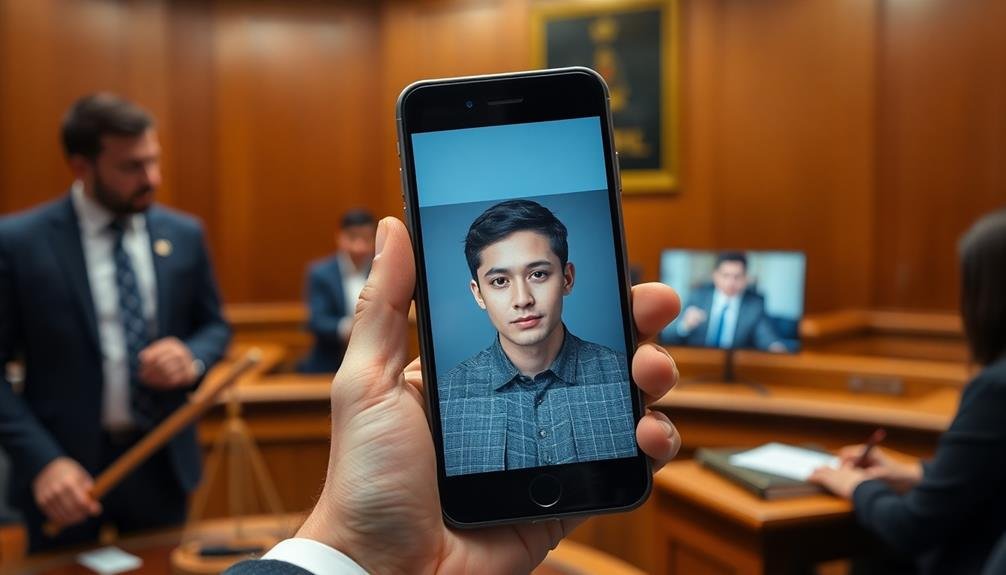
When you edit photos on your mobile device, you're entering a legal minefield.
You'll need to contemplate potential copyright infringement if you're altering or using someone else's images without permission.
Additionally, you must be aware of defamation risks and privacy law violations that can arise from manipulating or sharing altered images of individuals without their consent.
Copyright Infringement Concerns
As you engage in the world of mobile photo editing, it's crucial to understand the legal implications of altering images. Copyright infringement concerns should be at the forefront of your mind when manipulating photos. You might unknowingly violate someone's intellectual property rights by modifying or using their work without permission.
Consider these scenarios that could lead to copyright infringement:
- Incorporating elements from copyrighted images into your edits
- Using stock photos without proper licensing
- Altering and republishing branded content without authorization
- Removing watermarks or attribution from photos
- Editing and selling someone else's photographs as your own
To protect yourself, always use your own images or obtain proper licenses for any content you edit. If you're working with client photos, make sure you have explicit permission to modify and share them.
Remember that copyright laws vary by country, so familiarize yourself with local regulations if you're sharing edited images internationally. When in doubt, seek legal advice or consult with a copyright expert.
Defamation and Misrepresentation
Beyond copyright concerns, mobile photo editing raises considerable legal risks related to defamation and misrepresentation.
When you alter images of people or places, you're potentially creating false narratives that can harm reputations or mislead viewers. Defamation occurs when you publish edited photos that damage someone's character or professional standing. For instance, manipulating an image to place someone in a compromising situation or falsely associating them with illegal activities can lead to lawsuits.
Misrepresentation becomes an issue when you present edited photos as authentic representations of reality. This can be particularly problematic in journalism, advertising, or legal contexts. You might face legal consequences for using altered images to misrepresent products, events, or evidence.
Even seemingly harmless edits, like excessive retouching in fashion photography, can sometimes cross ethical lines and lead to legal challenges.
To protect yourself, always disclose when you've considerably altered an image. Be especially cautious when editing photos of public figures or for commercial purposes.
Privacy Law Violations
Privacy law violations pose another significant legal risk when editing and sharing mobile photos. You might unknowingly infringe on someone's privacy rights when manipulating or distributing images. This can lead to serious legal consequences, including lawsuits and financial penalties.
When editing photos, be aware of potential privacy violations such as:
- Capturing and sharing images of people in private spaces
- Altering photos to reveal personal information
- Using facial recognition technology without consent
- Sharing location data embedded in images
- Manipulating photos to create false impressions of someone's actions
It's essential to understand your local privacy laws and obtain proper consent before editing or sharing photos of others. Even if you've taken the photo yourself, you may not have the right to alter or distribute it without permission.
Be especially cautious when dealing with images of minors or vulnerable individuals.
Consider the ethical implications of your edits. Ask yourself if the changes you're making could violate someone's privacy or cause harm. When in doubt, err on the side of caution and respect others' privacy rights.
Impact on Professional Photography
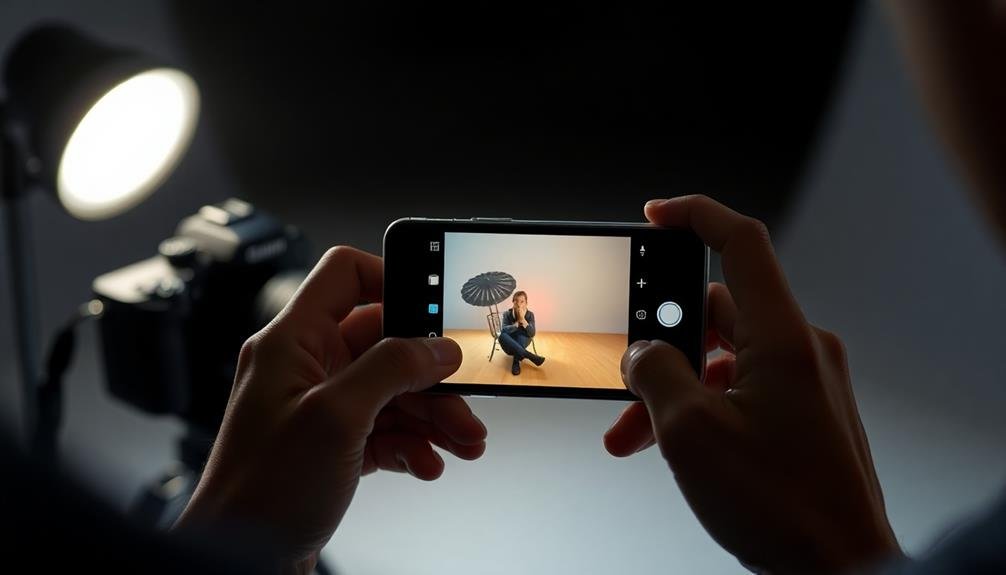
The rise of mobile photo editing has considerably disrupted the professional photography landscape. You'll find that advanced editing tools, once exclusive to professionals, are now readily available to anyone with a smartphone.
This democratization of photo editing has both positive and negative implications for your career as a professional photographer.
On one hand, you're facing increased competition from amateur photographers who can now produce high-quality, edited images. Clients might be tempted to hire less expensive alternatives or even attempt DIY photography for their needs.
You'll need to adapt by offering unique services that go beyond basic editing skills.
However, this trend also presents opportunities. You can leverage your expertise to teach mobile editing techniques, creating new revenue streams.
Additionally, you'll find that the widespread use of filters and presets has raised public awareness about photo editing, potentially increasing demand for your professional services.
To stay relevant, you'll need to continuously update your skills, focusing on advanced techniques that can't be replicated by mobile apps.
Emphasize your ability to create custom, high-quality edits that surpass what's possible with mobile tools alone.
Body Image and Self-Esteem
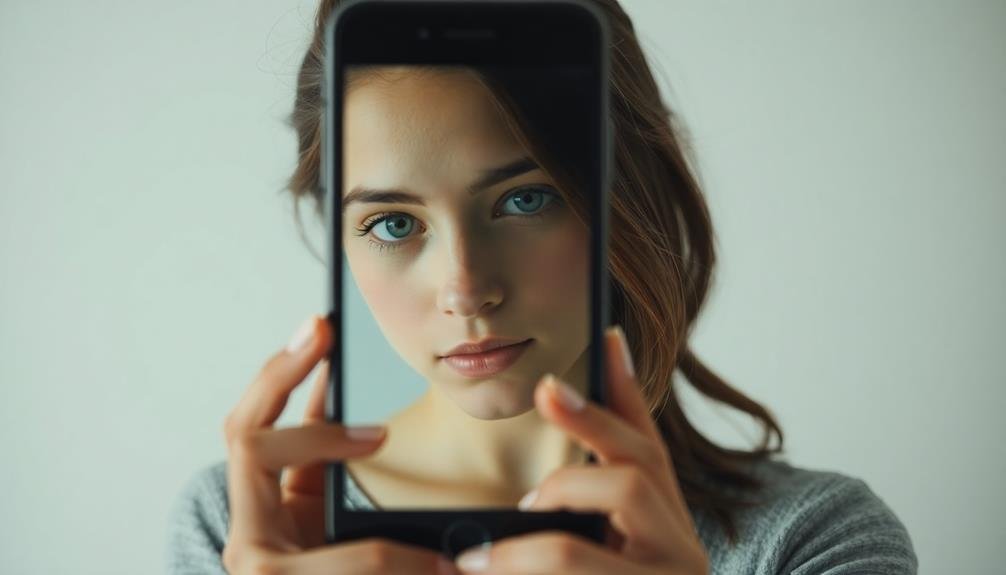
As mobile photo editing apps have gained popularity, their impact on body image and self-esteem has become increasingly apparent.
You've likely encountered edited photos on social media that showcase seemingly perfect bodies and flawless skin. These manipulated images can create unrealistic expectations and negatively affect your self-perception.
When you're constantly exposed to edited photos, you might start to:
- Compare yourself to unattainable standards
- Feel inadequate about your natural appearance
- Obsess over perceived flaws
- Seek validation through likes and comments
- Develop a distorted view of reality
You may find yourself spending more time trying to capture the "perfect" photo rather than enjoying the moment.
This pursuit of digital perfection can lead to anxiety, depression, and decreased self-esteem. It's essential to remember that most images you see online have been altered in some way.
Truth in Photojournalism

Photojournalists face unique ethical challenges when it comes to mobile photo editing. You're tasked with capturing reality, but the tools at your fingertips make it tempting to enhance or alter that reality.
It's vital to maintain the integrity of your images, as they serve as visual evidence of events and conditions. When you're in the field, you might be tempted to use filters or adjust colors to make a scene more dramatic. However, doing so can compromise the truth of the moment you're documenting.
Remember, your role is to inform, not to entertain or mislead. Stick to basic adjustments like exposure and contrast, which help clarify the image without changing its essence.
Be transparent about any edits you make. If you crop an image, make sure it doesn't alter the context. Avoid removing or adding elements to a scene, as this crosses the line into manipulation.
Your audience trusts you to provide an accurate visual record. By adhering to ethical standards, you uphold the credibility of photojournalism in an era where digital manipulation is rampant.
Influencer Responsibility and Transparency
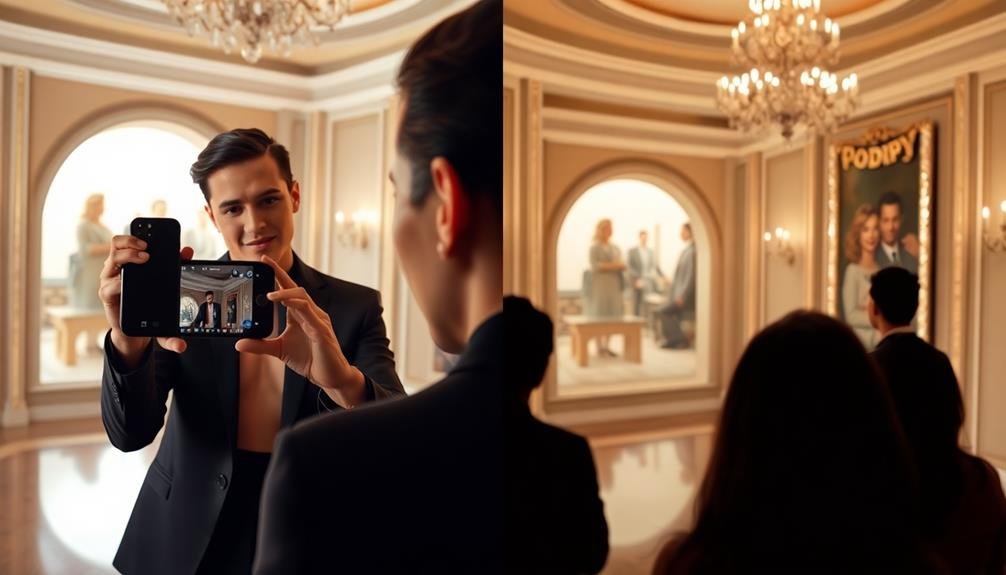
As an influencer, you have a responsibility to be transparent about your edited content.
You'll build trust with your audience by clearly disclosing when you've altered images and setting realistic expectations for your followers.
Disclosing Edited Content
Influencers wield considerable power in shaping public perception and trends. With this influence comes the responsibility to be transparent about edited content. You must disclose when you've altered images beyond basic adjustments, as your followers trust you to present an authentic representation of reality.
When you edit photos, consider the impact on your audience. Failure to disclose edits can lead to:
- Unrealistic beauty standards
- Misrepresentation of products or experiences
- Erosion of trust in your brand
- Negative self-image among followers
- Potential legal implications
Be upfront about your editing practices. Use clear language in captions or hashtags to indicate when an image has been considerably altered.
This transparency not only maintains your integrity but also educates your audience about the realities of digital media.
Setting Realistic Expectations
Social media influencers have a duty to set realistic expectations for their followers.
You're in a unique position to shape perceptions and influence behavior, so it's essential to use that power responsibly. When you edit your photos, consider the impact on your audience. Are you creating an unattainable standard? Are you misrepresenting products or experiences?
Be transparent about your editing process. Let your followers know when you've enhanced an image beyond basic adjustments. This honesty builds trust and helps maintain a healthy relationship with your audience.
It's okay to use filters and touch-ups, but don't alter your appearance so drastically that it's no longer recognizable.
Promoting Authentic Representation
Building on the importance of setting realistic expectations, promoting authentic representation takes transparency a step further.
As an influencer, you have a responsibility to show your followers a genuine portrayal of yourself and your life. This means being honest about your use of photo editing tools and filters.
When you share edited photos, consider adding a disclaimer or using hashtags like #filtered or #edited. This transparency helps your audience understand the difference between reality and enhanced imagery.
It's essential to maintain a balance between presenting your best self and staying true to your authentic image.
To promote authentic representation, focus on:
- Sharing unedited, behind-the-scenes content
- Posting a mix of polished and candid photos
- Discussing your editing process openly
- Showcasing real-life imperfections
- Encouraging followers to embrace their natural selves
Educating Users on Ethical Editing
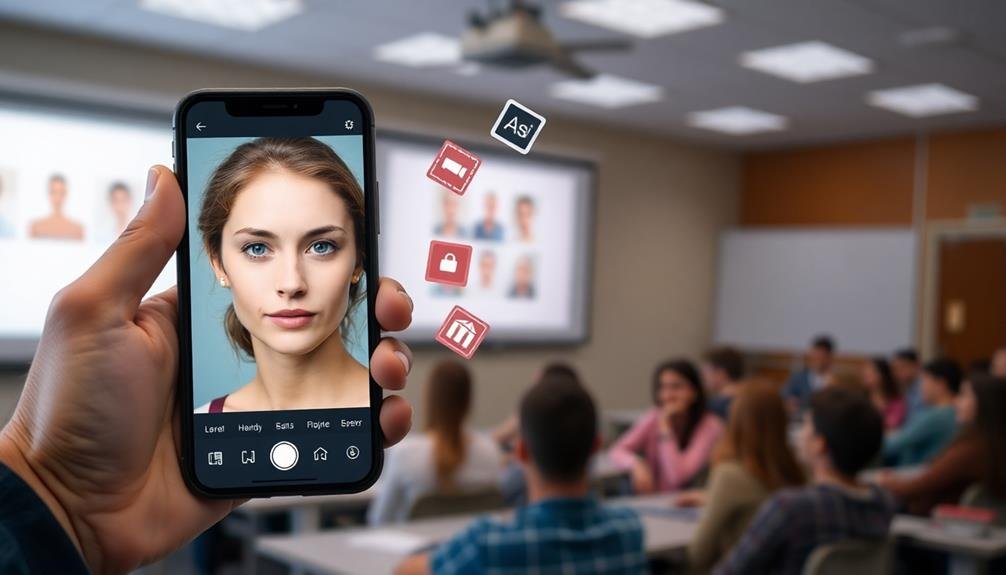
With the widespread use of photo editing apps, educating users on ethical editing practices has become essential. You need to understand the impact of your edited images on others and society at large.
Start by learning about common ethical pitfalls, such as altering body shapes, changing skin tones, or removing cultural identifiers. Familiarize yourself with your chosen app's features and their potential consequences.
Be aware that seemingly minor adjustments can greatly alter an image's message or authenticity. Consider the context and purpose of your photo before editing. Is it for personal use, social media, or professional purposes? Each scenario may have different ethical considerations.
Develop a critical eye for spotting overly edited images and learn to appreciate natural beauty. Encourage transparency by disclosing when you've made considerable edits. You can do this through captions or by using specific hashtags.
Seek out resources on digital literacy and media ethics to deepen your understanding of responsible editing practices. By educating yourself and others, you'll contribute to a more authentic and ethical digital landscape.
Balancing Creativity and Integrity
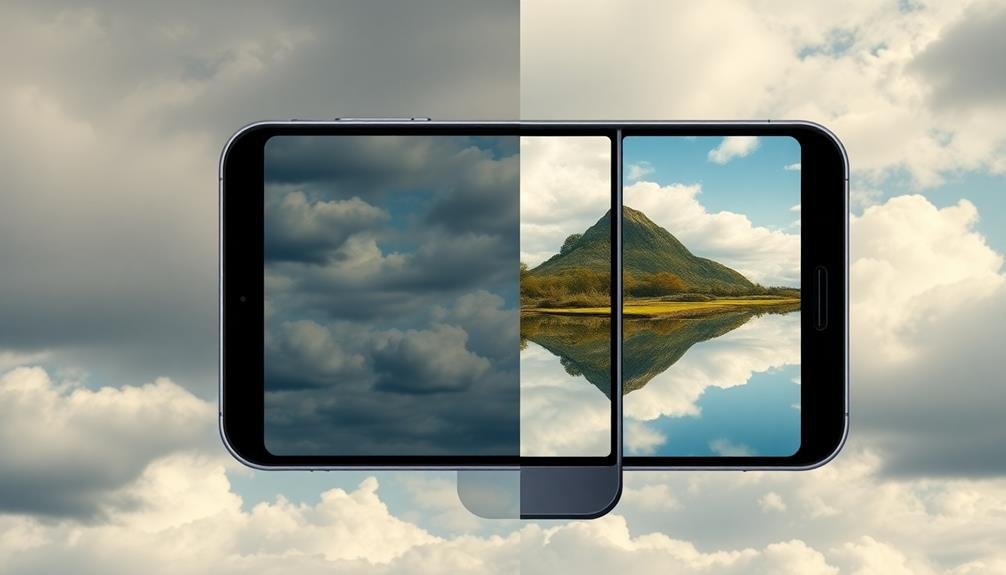
At the heart of mobile photo editing lies the challenge of balancing creativity and integrity. You're faced with the temptation to push boundaries and create stunning visuals, but you must also consider the ethical implications of your edits.
It's essential to find a middle ground where your artistic vision doesn't compromise the authenticity of the original image. When editing, ask yourself if your changes enhance the photo's essence or distort reality.
Consider the following scenarios:
- A landscape photo where you've intensified the sunset colors
- A portrait with smoothed skin and brightened eyes
- A travel shot with a distracting element removed
- A food image with enhanced colors and added steam
- A group photo where you've swapped someone's expression
Each of these edits requires careful consideration. Are you improving the image or creating a false representation?
Remember, your audience trusts your content. By maintaining integrity in your edits, you'll build credibility and respect. Embrace your creativity, but don't let it overshadow the truth.
Aim for a balance that showcases your skills while respecting the original scene. This approach will elevate your work and foster trust with your viewers.
Future of Mobile Photo Ethics

As mobile photo editing technology rapidly evolves, so too must our ethical evaluations. You'll need to stay ahead of the curve, anticipating new challenges and opportunities in the domain of photo manipulation.
Expect AI-powered editing tools to become more sophisticated, potentially blurring the line between reality and fiction even further. You'll have to grapple with questions about authenticity and representation as these technologies advance.
In the future, you may encounter stricter regulations on edited images, particularly in journalism and advertising. You'll need to adapt to potential watermarking requirements or metadata standards that disclose editing history.
Social media platforms might implement automated detection systems for heavily altered photos, forcing you to rethink your editing practices.
As virtual and augmented reality technologies merge with photography, you'll face new ethical dilemmas. How will you navigate the ethics of editing immersive experiences?
You'll need to reflect on the psychological impact of hyper-realistic edits and their potential to mislead or manipulate viewers. Ultimately, you'll play a vital role in shaping the future of mobile photo ethics by making conscious decisions about how you use these powerful tools.
Frequently Asked Questions
How Does Mobile Photo Editing Affect Mental Health in the Long Term?
You'll find that excessive mobile photo editing can negatively impact your mental health over time. It may lead to unrealistic beauty standards, decreased self-esteem, and increased anxiety. You're likely to feel pressure to maintain an idealized online image.
Can Excessive Photo Editing Lead to Addiction-Like Behaviors?
You can become hooked on photo editing. It's addictive when you're constantly seeking perfection in your images. You'll find yourself compulsively tweaking photos, chasing likes, and comparing your work to others', much like other addictive behaviors.
What Role Do Mobile Carriers Play in Promoting Ethical Photo Editing?
You'll find that mobile carriers don't play a significant role in promoting ethical photo editing. They're mainly focused on providing network services. It's up to app developers and users to prioritize ethical practices in mobile photo editing.
How Does Photo Editing Impact Personal Relationships and Dating Experiences?
You'll find that photo editing can greatly affect your relationships and dating life. It may create unrealistic expectations, lead to disappointment when meeting in person, and even erode trust if you're presenting an overly edited version of yourself.
Are There Age Restrictions for Using Advanced Photo Editing Features?
You'll find that most photo editing apps don't have strict age restrictions. However, you should be aware that some advanced features might require in-app purchases or subscriptions, which could have age limits for financial transactions.
In Summary
As you explore mobile photo editing, you'll face ethical dilemmas. Remember, it's not about avoiding edits altogether, but finding a balance between creativity and authenticity. Be mindful of the pressure to present a perfect image and consider the impact of your edits on others. Stay informed about evolving technology and cultural perspectives. Ultimately, you're responsible for your choices. Embrace ethical editing practices and contribute to a more transparent digital world.

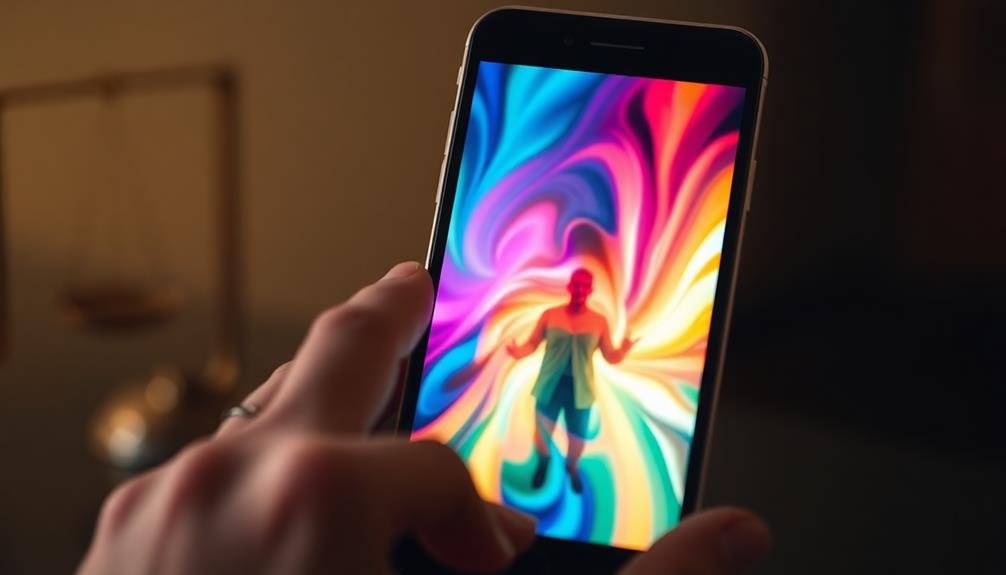



Leave a Reply